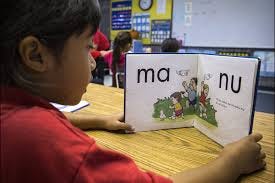A story in 4 parts: Part 1 posted here. (Still working on the others)
Post 1 (This post) Artificially changing language
Post 2: Our language & our thinking
Post 3: How language changes
Post 4: Update on the current language exchange
I’ve been in deep linguist mode thinking about the Trump administration’s efforts to “take out the WOKE” and jettison “offensive language” (“gender,” “transgender,” “immigrant,” “L.G.B.T.” and “pregnant people”) from federal websites. (FWIW, this includes removing our chosen pronouns from email signature). Late last night a colleague at a public health dept. messaged me that “pregnant people” is out, “pregnant women” is back in.
Whatever the wordsmithing winds up being, I can’t help but see this current word-trolling as another one of the characteristic linguistic ticks that many authoritarian personalities displayed throughout history. Each rattling society by “censoring” or “banning” language in a nod to their supporters and the generally flawed understanding of the powerful relationship between and their language.
Language changes all the time – sometimes it takes decades or even centuries, and sometimes it happens multiple times within a generation. Post 3 will take a deeper dive into how and why language changes, but just think here:
thou/thee, disabled, Y2K, bling, mansplaining, maybe even “selfie” – don’t hear that as much even from tourists.
Other words stay. As a youth of the Vietnam War and the Cold War, words like collateral damage, PTSD, war on terror, boots on the ground, cold war, iron curtain, space race, the arms race – powerful, symbolic, and signifying words deeply woven into the fabric of our lives.
Artificially changing language is showy (disruptive) and a nod to supporters, but it generally enrages the larger population (and sometimes the world) who insist on freedom of speech and freedom to think.
People have gone to war for their language
There’s a very long history of people and societies going to war for their language.
How it usually goes:
A people’s language has been suppressed, people are othered into hiding the use of their language, or (and it seems incomprehensible), their language is made illegal – sometimes for generations or centuries as during the Turkish–Ottoman 400 years occupation of Greece.
African American slaves brutalized for speaking their native language or communicating with their drums; Native American children forced to go to English-only boarding schools, the Babel Proclamation endorsed by Teddy Roosevelt, banning press in “foreign languages”; the US banning German in WW!; missionaries forbidding Hawaiian language in Hawaii, English imposed on Welsh, Scotts, Irish; Russia “the russification” of Poland, Ukraine, Lithuanian, Putin named people in Western Ukraine who speak Russian as a reason for invading and trying to annex Ukraine.
Chris – GET TO THE POINT!
What’s my current thinking about the Trump administration’s efforts at “cleaning up” nasty “Woke” language? Well, their lack of sensibilities certainly reminds me of McCarthy’s word choice describing his crusade of “skunk hunting” communists. But examples of successful language change by fiat are harder to come by and the change has to reflect or mirror people’s and society’s beliefs about itself.
Daniel Immerwahr recounts one of those successful language change examples. In his compelling book, (How to Hide an Empire, 2019), he explores how, by the time of the bombing of Pearl Harbor (Dec 7, 1941), the United States included a vast and populated number of lands – Hawaii, Alaska, Puerto Rico, the Philippines, Guam, Samoa, Wake and Midway Islands. Both Theodore Roosevelt and Woodrow Wilson freely called these “colonies.”
“Yet that spirit of forthright imperialism, didn’t last. Within a decade or two after passions had cooled, the “C” word became taboo. “The word “colony” must not be used to express the relationship which exists between our government and its dependent peoples”. Thus the “gentler” term – “territories.”
This is a clear example of a language change that didn’t occur organically. It was an artificial and rather strategic change that re-framed, even disguised, America’s empirical tendencies. And likely because Americans harbored only bad connotations to their own colonial origins, and because many states in the contiguous US initially started as “territories”, the word worked like a charm.
However, for this current administration, a prime enemy within are the very words and language of the people. The language that drives and reflects how we see ourselves, the world, and the hopes we have for both.
There are an infinite number of problems with making war on people’s language. In this particular moment in time, those in power seem to be treating words like a piece real estate property. You can try to update it with some cheap renovations, tear it down, foreclose on it, or simply “right it off.”
But words are not commodities. I am fully aware of the debate about linguistic relativism (eg. Whorf and others). This is the idea that the language you speak, determines how you categorize and perceive the world. I still always marvel at the example Whorf uses in talking about the Hopi Indian’s words for snow.
English speaker - “snow” “slush”…
Eskimo language Aluet – has many words for “snow” such as, “aniu” / falling snow, “apun” / snow on the ground, “muruaneq” / soft snow, “qetrar” / crust snow, “nutaryuk” / fresh snow, “qanisqineq” / snow floating on water,etc.)
Artificially cancelling language that is already established (native) in people’s language, indeed generations have grown up with these words and language, is not only wrong, it’s like watching a coming storm that can either pass… or cause grave destruction. Historians will either describe it as a time when American democracy was tested and came out better, or recounting a far more dystopian era.
Note: My Next Post - If you haven’t already left the room, I’ll write about the very close relationship between the language we use and how we think.
As always thank you.





